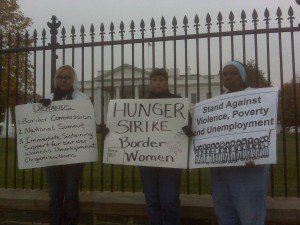LISTEN TO LORENA ANDRADE
Audio clip: Adobe Flash Player (version 9 or above) is required to play this audio clip. Download the latest version here. You also need to have JavaScript enabled in your browser.
Like so much of the border region, El Paso, Texas is poor. It was the North American Free Trade Agreement (NAFTA) that made it so, according to Lorena Andrade, an activist with La Mujer Obrera who is calling on the U.S. government to take steps to alleviate the poverty. Along with 12 other women from El Paso, Andrade came to the nation’s capital to inform the U.S. government that, “Women on the border are not disposable. We can’t just be thrown on the side of the road and be abandoned. That we actually can think and we can plan for our communities and that we deserve investment in order to do that.”
Acting as a spokesperson for the 11 women on Day 8 of their hunger strike outside the White House, Andrade said, “El Paso and the whole border region is actually one of the poorest regions in the United States. We have high unemployment. For example, in El Paso, Texas, with the North American Free Trade Agreement we lost more than 35,000 jobs. And really the only structures in our community… were those factories. So we have housing projects and those factories. And when those factories left, we were left with nothing, with just abandoned buildings. We don’t have, for example, any infrastructure like… rec centers or libraries or school for adults. We don’t have any of those resources. Nothing happened to replace that [loss]. The government never brought new jobs. They didn’t bring any good re-training programs.”
The women of El Paso are not calling on the government to take the lead in creating jobs and making the needed improvements, only to assist them in their ongoing efforts. Andrade said, “So as women, when we saw our community that was so devastated by the economic decisions, and now with the violence, we had to make a decision that we were going to renovate our communities ourselves. That it was up to us to create jobs and to create a more stable community. So we began to build, for example, daycare centers and cafes and now a market place, even a trading company, in order to provide jobs. And really all of that infrastructure is really a school; a school for our community to go and discover, ‘Hey what is it that we want to learn? Where do we want to work? What is it that we need to construct in order to have a complete community?’ And as women we’ve taken it upon ourselves to build every one of those pieces, to reconstruct what was destroyed.”

